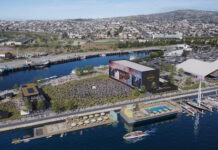
South Korea’s logistics industry stakeholders have decried the Korea Fair Trade Commission’s (KFTC) recent financial penalties on 12 country’s liner operators, describing it as “a double blow amid tight shipping capacity”.
At an industry seminar organised by Korea Shipowners’ Association (KSA) on 23 June, Korea International Trade Association official Kim Byung-yoo said, “I’m concerned that the fines will aggravate the logistical crisis and weaken the competitiveness of our export-oriented economy, especially in the current situation where exports are expected to increase significantly, ahead of Thanksgiving and Christmas.”
On 8 June, KFTC imposed fines totalling KRW500 billion (US$440 million) on 23 liner operators, including HMM, SM Line, Sinokor Merchant Marine, Pan Ocean and another eight South Korean companies.
Following complaints from timber importers, KFTC’s investigations found that 23 liner operators and the Committee Of Shipowners For Asian Liner Service had come up with 122 freight-related agreements pertaining to the South Korea-Southeast Asia route.
Kim Byung-yoo noted, “KFTC’s actions may lead to similar investigations by anti-trust authorities in Southeast Asian countries. Some improvements in procedures for joint actions are necessary. Perhaps we should take measures to stabilise freight rates and promote the signing of long-term shipping contracts.”
KSA vice-chairman Kim Young-moo said that the tight capacity and the KFTC’s fines are the biggest issues facing the container shipping industry in South Korea.
He added, “South Korean liner operators are already mobilising all available ships to fulfill ad hoc services. If they’re fined and they have to sell their ships to raise the funds, this will make it more difficult for shippers.”
Logistics professor, Han Jong-kil noted that European container carriers such as Maersk Line, Mediterranean Shipping Company and CMA CGM have become dominant players as the European Union permits alliances, but not price-fixing.
He went on to argue, “As European shipping companies dominate the market, major advanced countries such as the United States and Japan need to keep an eye on excluding the anti-monopoly law for the shipping industry. Market power of liner operators has expanded to the extent that they influence the market order, so it can be seen that joint action can stabilise the market.”
Martina Li
Asia Correspondent




